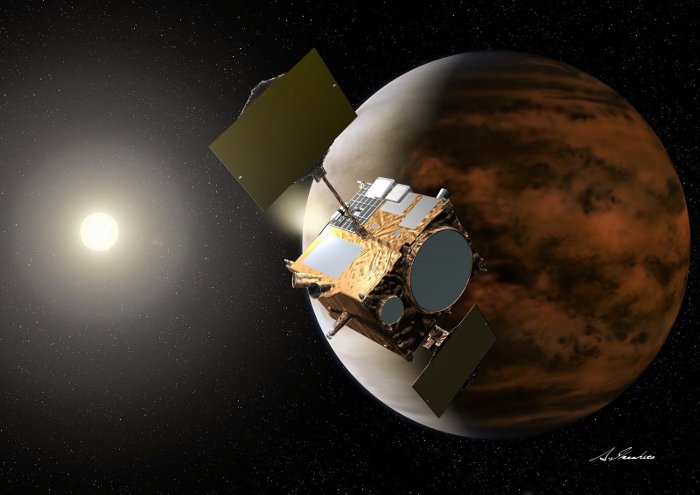Japanese probes search for Venus
After "missing" Venus in 2010, this time the Japanese Akatsuki probe went into orbit successfully and became the only dynamic satellite orbiting the second solar system.
In space, people don't have a second chance every day. When an exploration ship "catches" its target, it can fall apart or disappear forever in the universe.Akatsuki probe (Japanese means "dawn") chose a third solution: waiting to seize another opportunity. With the code of Planet-C , the Akatsuki was launched by the Japanese Space Agency on May 21, 2010 and was near Venus on December 8 that year. But that day a valve was abnormally closed, damaging part of a propulsion. The passage into Venus's orbit failed, and the ship continued its orbit . around the Sun.
This is not the first time that a Venus exploration mission has failed. From the Russian mission Sputnik 7 in 1961 did not even escape Earth's orbit to the Shin'en spacecraft launched by Japanese universities in 2010, but it was lost shortly after the launch. Up, the probes targeting this second planet were not lucky. But Japanese experts analyzed the cause of the failure and decided to "probe" hibernation, hoping to give it the last chance when it comes near Venus in the next five years.
So exactly five years later, Akatsuki launched propulsion to change the trajectory on the night of December 7, 2015. If it fails, it can continue to travel around the Sun or follow a more uncertain route. Success will bring it to where it should have been in 2010: orbit around Venus.
Do not dare to boast of victory, but officials in the Japanese Space Agency seem very optimistic. They said it took another two days to analyze all the data and confirmed that Akatsuki had gone around Venus, but the information gathered made people think that everything was successful.

The Akatsuki has launched propulsion engines to change its trajectory on the night of December 7, 2015.
What is Venus's concern? Now people tend to pay more attention to Mars. There are currently five exploration ships flying around Mars orbit and two self-propelled vehicles on the surface and many projects for human missions.Akatsuki is the only dynamic satellite flying around Venus. In many areas, Venus is so similar to the Earth that sometimes people call it twin sister with the green planet. A fake twin brother because both of them have the same size and volume, the same gravity and dense atmosphere. But similarities are just that.
On Venus, a long day equals 117 days on Earth and 1 year has 225 days. The planet revolves around the axis in the opposite direction to the Earth: The sun rises in the west and sets in the east. Furthermore, the temperature on the surface of Venus is very hot, about 460 ° C. The atmosphere is 92 times denser on Earth and must be at a height of 50km to get the same pressure as the surface pressure. Earth. Summer vacation on it is not interesting!
The atmosphere of Venus is the cause of the difference. Constructed mostly of carbon dioxide with sulfuric acid clouds and winds that can reach speeds of 100m / sec, Venus is an example of a powerful greenhouse effect. And it is the atmospheric phenomena that are central to Akatsuki's measurements.
Europe's Venus Express probe started work in that direction by studying the giant tornado above Venus's south pole. But Venus Express, which has a mission for 8 years and ended in 2015, focuses not only on climate phenomena: it also analyzes atmospheric composition as well as surface phenomena such as volcanoes or structures. creation of soil.
Akatsuki was introduced as " support" for Venus Express. The Japanese exploration ship, which costs 24.4 billion yen (equivalent to 181 million euros), has been appointed to become Venus's "meteorite" when studying the wind and behavior of the planetary atmosphere.
"Akatsuki is the first interplanetary probe that deserves to be called meteorological satellite," said project scientist Takeshi Imamura. Akatsuki will map the clouds and provide elements that help create a better 3D model of meteorological phenomena on the planet. It also tries to find the presence of lightning bolts, which so far have not been confirmed.
The study of Venus's atmosphere to know more about phenomena on Earth."Why is it that what happens on Venus today is different on Earth? Once you can explain the structure of Venus, we can better understand the Earth. For example, we can examine The reason why only the Earth has an ocean and why only the Earth has a rich life, we can also understand changes in atmospheric mass and rotational velocity affect the current We need to understand Venus to understand the Earth more, " said scientist Imamura.
- Overview of Venus
- Venus can stay?
- NASA wants to bring people to Venus
- Venus Experss are about to plunge into the Venusian atmosphere
- Venus is about to be a
- After 8 years of Venus exploration, Venus Express has run out of fuel
- 10 most interesting things about Venus
- Plan to conquer human Venus
- The ocean may exist on Venus on Earth about 700 million years ago
- Video: Unusual midnight in hell Venus
- Is there life on Venus?
- Venus has volcanic eruptions
 Van Allen's belt and evidence that the Apollo 11 mission to the Moon was myth
Van Allen's belt and evidence that the Apollo 11 mission to the Moon was myth The levels of civilization in the universe (Kardashev scale)
The levels of civilization in the universe (Kardashev scale) Today Mars, the sun and the Earth are aligned
Today Mars, the sun and the Earth are aligned The Amazon owner announced a secret plan to build a space base for thousands of people
The Amazon owner announced a secret plan to build a space base for thousands of people